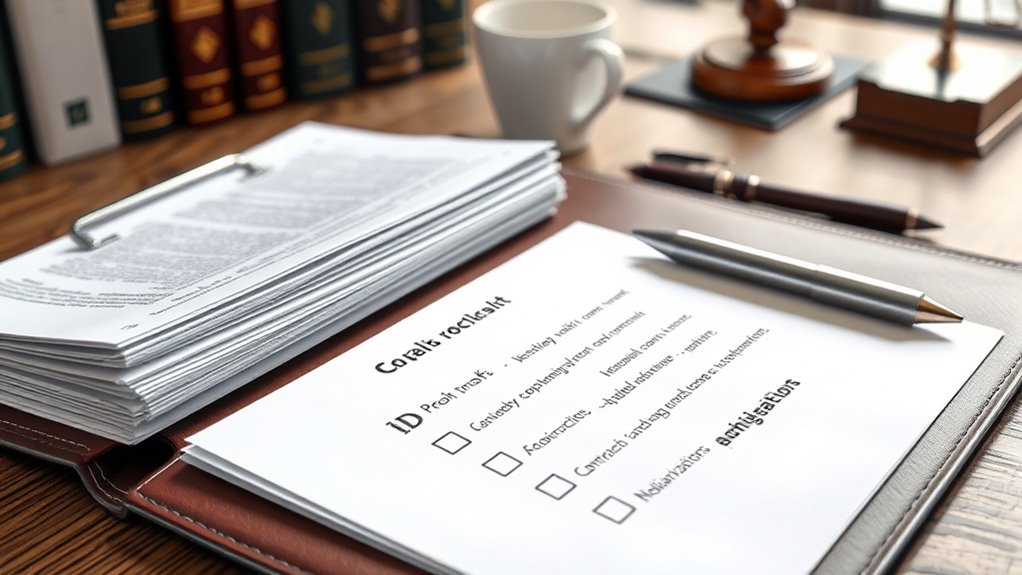When it comes to legal documents, myths often lead you to believe that once signed, they’re unchangeable or that complex language always invalidates a document. The fact is, proper formatting, clear language, and compliance with legal standards are vital for validity, and updates are possible with right procedures. Understanding the importance of witnesses, notarization, and digital signatures helps guarantee your documents are enforceable. Keep exploring to uncover essential tips for safeguarding your estate and rights effectively.
Key Takeaways
- Properly drafted legal documents clarify intentions, protect assets, and prevent disputes in estate planning and business agreements.
- Updating legal documents requires formal amendments or new agreements, not just notes, to ensure validity.
- Signatures, witnesses, and notarization are essential for the enforceability of wills, powers of attorney, and contracts.
- Digital signatures are legally valid if they meet jurisdictional standards for authenticity and security.
- Many legal myths stem from misconceptions; consulting professionals ensures documents are correctly prepared and maintained.
Understanding the Purpose of Legal Documents

Understanding why legal documents matter helps you appreciate their significance in retirement planning. They’re not just formalities; they’re tools to safeguard your legacy, guarantee clarity, and provide peace of mind for you and your loved ones.
Common Myths About Wills and Estate Planning

Many people believe that creating a will is only necessary for the wealthy or those with complex estates, but this is a common misconception. Everyone benefits from proper estate planning, regardless of estate size. Common myths include:
- Believing estate taxes won’t affect you—yet, proper beneficiary designations can help minimize taxes.
- Thinking a will alone is enough—trusts and beneficiary designations also play crucial roles.
- Assuming only wealthy individuals need estate planning—every person’s assets, no matter the amount, can be impacted by poor planning.
- Overlooking the importance of detailed documentation, which can improve color accuracy and overall clarity during estate settlement.
Understanding these myths helps you avoid costly mistakes and ensures your estate is handled as you intend. Proper estate planning is essential to protect your loved ones and simplify the transfer process.
The Truth About Power of Attorney Requirements

Understanding the requirements for a valid Power of Attorney is essential to guarantee it’s enforceable. You need to meet specific documentation standards and follow state guidelines carefully. Let’s clarify what makes a Power of Attorney valid and the documentation you’ll need. Proper home decor choices in the presentation of the document can also influence its perceived legitimacy and professionalism.
Power of Attorney Validity
Wondering if your power of attorney will hold up when it matters most? Making certain your document’s validity is essential. Here are key points to confirm:
- The power of attorney must be signed voluntarily and without coercion.
- It needs to be properly notarized or witnessed, depending on your state’s rules.
- The document should clearly specify the powers granted and be current—expired documents may be invalid.
- Ensuring that the document is free from errors and ambiguities can help prevent disputes and document invalidation.
These steps help guarantee the document’s validity, making sure it’s enforceable when you need it. Remember, even a well-drafted power of attorney can be invalidated if these requirements aren’t met. Checking these points helps protect your interests and ensures your wishes are respected during critical moments.
Required Documentation Standards
Ensuring your power of attorney is valid isn’t just about signing the document; it also depends on meeting specific documentation standards. Proper document formatting is essential to avoid legal jargon confusion and ensure the document’s validity. You must provide clear, legible, and correctly formatted paperwork, following state-specific requirements. Here’s a quick overview:
| Requirement | Description | Example |
|---|---|---|
| Witness Signatures | Signatures of authorized witnesses as per legal standards | Two witnesses required |
| Notarization | Notarize the document if mandated by your jurisdiction | Certified seal needed |
| Proper Formatting | Use correct font, margins, and structure to meet legal standards | 12-point font, standard margins |
| Document Copies | Keep certified copies for your records | Certified copies stored |
| Legal Jargon Clarity | Use plain language; avoid ambiguous legal terms | Clear, straightforward terms |
| Document Validity Standards | Ensure compliance with specific Juice Cleanse and Detox guidelines to maintain legal effectiveness |
Debunking Misconceptions Surrounding Business Contracts

Many people believe that business contracts are overly complicated or unnecessary, but that’s a myth. In reality, contracts clearly define expectations and safeguard your interests. Understanding the truth helps you avoid common mistakes and ensures your agreements are solid. Incorporating well-structured legal documents can also prevent issues related to unclear terms or misunderstandings.
Common Contract Myths
Are common contract myths causing you to overlook important legal details? Many believe that signing a document guarantees its contract validity or that legal jargon makes contracts too complicated. These misconceptions can lead to risky decisions. To clarify things:
- You don’t need complex language for a contract to be valid—clear, mutual agreement matters more.
- A signature alone doesn’t ensure enforceability; understanding the terms is essential.
- Legal jargon isn’t a barrier; it’s meant to clarify, not confuse, and doesn’t affect contract validity if both parties agree.
Don’t let these myths cloud your judgment. Knowing the truth helps you craft enforceable contracts and avoid costly misunderstandings. Being informed about legal details ensures your business agreements are solid and reliable.
Contractual Reality
Contrary to popular belief, the reality of business contracts is often simpler and more straightforward than most assume. While contractual nuances and legal jargon can seem intimidating, they’re usually just formalities that clarify intentions. Most contracts are built on clear, mutual understanding rather than complex legal language. You don’t need to be a lawyer to grasp the essentials or to spot key terms. The core elements—offer, acceptance, consideration, and obligations—are accessible and practical. Misconceptions suggest contracts are confusing or overly complicated, but in reality, they’re designed to protect all parties involved without needing to decode dense legalese. Understanding this helps you approach contracts with confidence, focusing on the substance rather than getting lost in legal jargon. Recognizing the emotional support embedded in these agreements can also foster better communication and trust between parties.
Do You Really Need a Lawyer to Draft Every Document?

Do you really need a lawyer to draft every document? Not always. While legal jargon and proper document formatting are vital, many simple documents don’t require professional help. Here’s when you might handle it yourself:
- Basic agreements or letters – If it’s straightforward, templates or online tools can suffice.
- Understanding legal jargon – If you can interpret the language and guarantee your rights are protected.
- Reviewing drafts – You can spot errors or inconsistencies if you understand document formatting basics.
- Knowing about Pimple Patches — Being aware of specific product details can help you assess whether a document is accurate or needs professional review.
However, for complex or high-stakes documents, consulting a lawyer is wise. They help avoid mistakes and guarantee your document holds up legally. Not every document needs a legal expert, but knowing when to ask for help is key.
The Reality of Digital Signatures and Electronic Agreements

Digital signatures and electronic agreements have become increasingly common, transforming how you handle legal transactions. Digital signatures provide a secure, verifiable way to sign documents online, making paper-based signatures less necessary. Electronic agreements streamline the process, allowing you to execute contracts quickly without physical meetings or mailing. Many jurisdictions recognize digital signatures as legally binding, provided they meet specific standards for authenticity and integrity. However, it’s essential to understand the rules governing these agreements in your area, especially for sensitive or complex transactions. While digital signatures offer convenience and efficiency, they still require careful handling to ensure legality. To enhance the security of these digital transactions, implementing encryption solutions is highly recommended. Overall, embracing electronic agreements can save time and resources, but always verify that your digital signatures comply with applicable laws.
Myths About Updating and Revising Legal Documents

Many people believe that once a legal document is signed, it’s set in stone and can’t be changed. That’s a myth. You can update or revise your legal documents, but it requires proper steps. First, understand that legal jargon can be confusing, so clear language is essential. Second, document formatting matters; revisions must be consistent and properly formatted to be valid. Finally, changing a document often means creating an amendment or new agreement, not just scribbling notes. The key is consulting a professional to ensure your updates are legally sound. Additionally, understanding the importance of financial affidavits and proper disclosure can help avoid future disputes. Don’t assume that a signed document is forever fixed—legal flexibility exists, but it must be handled correctly to avoid future issues.
Clarifying the Need for Witnesses and Notarization

While legal requirements vary by document and jurisdiction, having witnesses and notarization often plays a crucial role in guaranteeing your documents are valid and enforceable. Witness requirements can differ, but they help confirm your identity and intent. Notarization procedures add an extra layer of credibility, making documents harder to dispute. Without proper witnesses and notarization, your legal documents may face challenges or be deemed invalid.
| Why It Matters | How It Benefits You |
|---|---|
| Ensures validity | Protects your rights |
| Prevents disputes | Adds legal weight |
| Builds trust | Reduces future conflicts |
| Meets legal standards | Provides peace of mind |
Essential Checklist Items for Every Legal Document

To make certain your legal documents are valid and enforceable, you need to include several essential items. First, ensure all relevant legal jargon is used correctly to avoid ambiguity. Second, pay close attention to document formatting—use clear headings, consistent fonts, and proper spacing to enhance readability and professionalism. Third, verify that all necessary signatures, dates, and witness details are correctly placed, as missing or incorrect information can invalidate your document. Including a clear and concise language style helps prevent misunderstandings. Remember, proper formatting and precise wording are key to making your legal documents both effective and enforceable. By following this checklist, you minimize legal risks and ensure your documents stand up in court if needed.
Frequently Asked Questions
Can I Create Legal Documents Without Legal Training?
You can create legal documents without legal training, but it’s risky due to legal jargon and document complexity. Without proper knowledge, you might overlook important clauses or misunderstand legal terms, which can lead to issues later. While templates and online resources help, consulting a legal professional guarantees your documents are accurate and enforceable. Relying solely on DIY methods might save money now but could cause costly problems down the line.
Are Digital Signatures Legally Binding Everywhere?
Digital signatures are legally binding in many countries, but their legal validity varies depending on local laws. You should check the specific regulations in your jurisdiction to guarantee your digital signature meets the legal standards required for your documents. Generally, digital signatures provide a secure way to sign documents electronically, but their enforceability depends on how well they comply with regional e-signature laws.
How Often Should I Review and Update My Legal Documents?
You should review your legal documents at least once a year to guarantee they’re current and accurate. Imagine your life changing—buying a house, getting married, or starting a new job—these events can impact your documents. Regular document review and update frequency help you stay protected. Don’t wait until a crisis; proactive updates keep your legal plans aligned with your evolving circumstances, giving you peace of mind.
Is Notarization Always Required for Legal Documents?
Notarization isn’t always required for legal documents, but it depends on the document type and jurisdiction. Notarization requirements verify authenticity and prevent fraud, which can be essential for contracts or estate documents. Digital signature legality varies by state, with many accepting electronic signatures if they meet specific standards. Always check local laws and specific document requirements to determine if notarization or digital signatures are necessary for your legal documents.
Can I Use Templates Instead of Hiring an Attorney?
Using templates for legal documents is like building with prefabricated blocks; it might seem easier but can lack the precision you need. While templates provide basic structure, they often fall short in addressing complex legal jargon or specific circumstances. Customizing documents ensures they’re tailored to your situation, reducing risks. Hiring an attorney guarantees professional review and proper document customization, offering peace of mind that your legal needs are fully protected.
Conclusion
So, now that you’ve cleared up all these myths, you’re practically a legal expert—well, almost. Remember, not every misconception is a disaster waiting to happen, but ignoring the facts could turn your legal plans into a comedy of errors. Stay savvy, double-check that checklist, and don’t be afraid to ask a pro if things get tricky. After all, in the world of legal docs, knowing the truth is your best defense—unless you like surprises.









